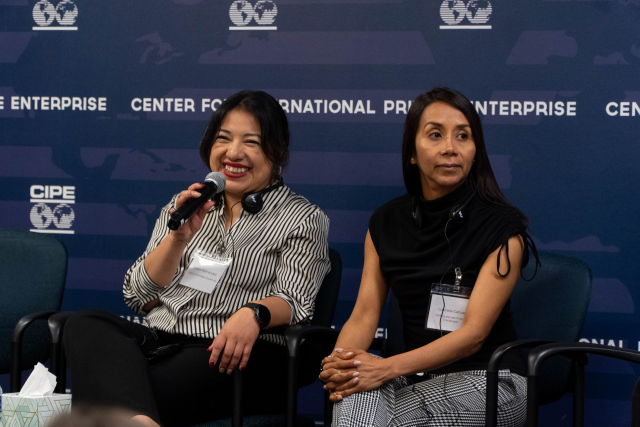Good endings make for better beginnings, and that’s the spirit that infused CIPE’s Washington, D.C. headquarters on September 19. With a major program run by CIPE’s Center for Women’s Economic Empowerment (CWEE) and CIPE regional teams from Morocco, Papua New Guinea (PNG) and Guatemala coming to its scheduled end, women business leaders gathered from four continents to reflect on the successes and lessons learned over their past four years. Their hard-won insights will shape the next generation of programs for women’s economic empowerment.

Center Director Barbara Langley opened the event with a reflection on the importance of the core offerings and ongoing impact of the ‘Economic Inclusion and Leadership for Women and Marginalized Populations’ program. She highlighted the creation of Women’s Business Resource Centers (WBRCs), which serve as safe spaces and training centers for women entrepreneurs; and the creation of Women’s Business Agendas, through which women business owners and leaders of relevant business associations collaborate on an advocacy plan. These are next used to advocate governments to remove barriers to women’s economic inclusion and close the gender gap.
“It’s been so incredibly rewarding to see our partners organize and lead on priorities they’ve identified for their communities and their countries,’’ Langley told the crowd. “There are so many similarities despite the differences in cultural, political, and economic backgrounds. CIPE’s learning has really been enriched thanks to their talent and collaboration.”
Those tenacious women did not disappoint.
Presentations kicked off with Ezzaytouniya Makssoud, Khadija Elgharbaoui, Khadija Ben Moumen, and Rachida Zakri, leadership from three distinct Moroccan regional organizations under the EntrElles umbrella representing female entrepreneurs and small businesses in Souss Massa, Marrakech, and El Jadida. They hit on an idea that drew murmurs across the room: the tiring process of debunking the belief that business is for men. And that triggered a moment of solidarity. The Guatemalan women nodded, and so did the Papuans. The Moroccan delegation hopes to change this through its Women’s Regional Business Agendas, which call on government to establish a quota of at least 33% of public contracts awarded to women-owned business.
EntrElles’ leaders then ceded the stage to Eli Webb and Luania Temu, from Port Moresby, PNG. Temu is now a seasoned executive overseeing six separate SMEs in Australia and PNG and a sought-out mentor to younger Papuan women. She expressed her thanks to colleagues and to the team, and highlighted a crucial part of CIPE’s offering that helped her. “The networking in particular is crucial, and I am so grateful to come to Washington and be here today,” she said. “I was one of those women who had little and needed this help. It’s so hard when you’re working at it all alone.”
Temu, who is a member of the Steering Committee of the Business Advocacy Network (PNG BAN), explained that the process of developing a business agenda in PNG made her understand the impact of policy on her business and see the value in advocacy. The process of developing a WBA in PNG, for the first time, gave her both the opportunity and space to talk to public officials about women’s small and micro businesses and the struggles they face, especially given that most of them work in the informal economy in PNG. She stressed that members had to advocate for women’s business associations to be recognized as advocates for women in business.
From Guatemala, the local team shared that the greatest successes of Corali, CIPE’s Women’s Business Resource Center in Quetzaltenango, is that it is ‘transforming realities’ through its work in helping women start, scale, and develop their business ideas. Since its inception in 2021, the center has trained 440 budding entrepreneurs, and that group has gone on to start 29 new businesses and create 35 new jobs. Part of Corali’s success, CIPE’s Guatemala Program Coordinator Gabriela Cahuex explained, is the on-site daycare. Household and parenting duties are one of the major obstacles to women’s economic empowerment; their families expect them to prioritize these roles. Giving an opportunity to women to attend Corali trainings and programs, knowing that their children are nearby and in safe hands, was a major lesson and a programming feature sure to boost impact.
But Corali’s programming expands beyond the details of how to move a business plan from idea to reality – CIPE and its local partners also use the facility to boost the civic participation of women in Guatemala through women’s rights seminars and legal advisory services. Many women who participate in Corali’s programs had never voted before and had even been told that this was a man’s privilege and not a woman’s. Corali rights these wrongs.
As the day closed, the women on the stage were asked for a final comment, and to provide any final advice to CIPE as its managers design the next generation of these empowerment programs. The last word – and some of the day’s most telling words – came as a warning from Mozhgan Wafiq Alokozai, CEO of Eagle Online Academy, a Washington-based non-profit educational organization for women and girls. “If you are a woman,” she said, “and you are not involved in politics, then soon the politics will be running your business.”
Published Date: November 01, 2023